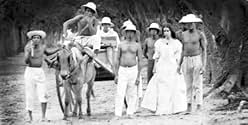As dificuldades enfrentadas por uma jovem escrava branca de coração bondoso na mira da obsessão do seu amo no período colonial brasileiro.As dificuldades enfrentadas por uma jovem escrava branca de coração bondoso na mira da obsessão do seu amo no período colonial brasileiro.As dificuldades enfrentadas por uma jovem escrava branca de coração bondoso na mira da obsessão do seu amo no período colonial brasileiro.
- Prêmios
- 1 vitória no total
Explorar episódios
Avaliações em destaque
a beautiful series. exotic, romantic, naive. and the inspired introduction to the history and culture of Brasil. because it has the gift to be more than a soap opera. its refined poetry, its clash between a young woman and a terrible master, its delicate manner to remind emotions and songs and ways to live and love and hope are great. real great. the sounds from the film, the sparkles of scenes, after decades, are fresh. not only for its status of the first soap opera on the Romanian TV screens after 1989 but for its strange and seductive force to be unique. so, a special series and one of the lovely examples of Brazilian cinematography.
I'm not into soap's and never considered "Escrava Isaura" as a soap opera. North American soap's go on forever and depending on the writers and characters you never know where the story begins or if it will ever end! Escrava Isaura is what I would call a mini-series. It's based on a book by Bernardo Guimaraes and takes place in Brazil during African slavery in the mid 1800's. Though not based on a true story but like the movie Titanic....it sunk but the love story between Jack & Rose was fictional. The story takes us to Isaura's pain in the hands of her master's son, her struggle for freedom and the dream of one day being with her true love. It's heart warming and heart wrenching. I loved it when it first aired in 1977 and still one of my favourites to this day.
it was first soap opera on the Romanian TV screens after Revolution of 1989. and, like in many other countries, it was a real phenomenon. explanation is easy. skin for liberty air, exotic, seductive,fresh after gray propaganda, story about sufferance and full of romanticism, meeting with a beautiful talented actress, the common crumbs between Portugues and Romanian language, with a story far to be complicated, it was perfect food of expectations of large public. after years, it is only a kind of legend. seed of good memories, sign of a form of innocence, toy for relation with past. but its flavor is not gone. the success of soap operas is basic proof. sure, Turkish or South - Coreean, Indian or American, each is different. but, in case of Romanian viewer, Escrava Isaura was first step for this friendship with pink series.
ESCRAVA ISAURA, except for some American sagas of the time (the mid-1980s), was one of those soap operas that absorbed almost all Polish society. Being showed on public television (no other existed) once a week, the series constituted the oasis of freshness in the desert of Russian propaganda. But that was not the only reason we still consider this soap opera a true social phenomenon.
Why "phenomenon" in Poland? The story of a poor girl who lived the life of a slave in Pre-abolitionist Brazil touched to tears, mesmerized, overwhelmed, simply taught how to live and how to deal with cruelty. People, including youngsters, families and elderly ladies watched the episodes with greatest attention and talked about it through weeks wondering and suggesting what would happen in next episodes. The emotional debates were heard in buses, trains and streets alike, young mothers named their baby daughters Isaura, crowds of fans flocked to meet the couple Lucelia Santos and Rubens De Falco during their "Polish tour" in May 1985...simply you could reasonably call it "madness" or more gently a "exaggeration". But no one would listen to this voice of reason. Those were the crazy days of the mid-1980s... However, when one of the televisions re-released the series twenty years later, a few people got interested to see what is so special about the story that absorbed the society in the 1980s. I was one of those people despite the fact I don't fancy such sagas whatsoever.
After seeing the fragments of the soap opera, I came into conclusion that there are three aspects that might have made the series so popular: genuine performances, nicely executed content and...its exotic origin. Brazil is still one of those most exotic countries for Poland and truly one of the places that is in particular interest. And ESCRAVA ISAURA gives us an insight into Brazil, the Brazil of cruel times of slavery but, at the same time, the one of traditional life untouched by commercialism.
As far as performances are concerned, the actress who gives a fresh, genuine acting uninfluenced by any fame is Lucelia Santos. She makes her character easy to sympathize with; more to say, a character to identify with. Ms Santos appeared in some other Brazilian soap operas later, but indeed the role of Isaura is the one of hers and for her: innocence, fresh youth and genuine suffering! Rubens De Falco does a splendid job as the villain Leoncio De Almeida who constitutes the idea of character development expressed in soap operas: not much psychology, no ambiguity...instead just simple representation of black and white nature of humans - either good or evil (in more colloquial language such "goodies" and "baddies"). That is why majority of people loved it since the characters were simple to evaluate. That is what makes us detest Leoncio the moment we see him. That refers also to supporting cast who do fine jobs in their roles and situations galore but whose characters are also unambiguous.
And, finally the content filled with plotting, love affairs, cruelty, jealousy, pardoning, variety of spiritual and mental states...that is something people know and experience daily, that is something that can be convincing and, at the same time, particularly involving.
You will perhaps think why my comment is more a reflection of why the series was so popular rather than about my own feelings concerning it. Here individual feelings are not that crucial since the personal whisper is bound to give way to common shout. ESCRAVA ISAURA, being a soap opera, is a special one, a phenomenon of popularity that has never appeared again to such extend.
And now...after all these years, naturally, the impressions are gone. Some people mock, some, perhaps, ignore; others recall it with a few sentimental tears. Nevertheless, boring and dated as it may seem, the "once" phenomenon cannot be denied...
Why "phenomenon" in Poland? The story of a poor girl who lived the life of a slave in Pre-abolitionist Brazil touched to tears, mesmerized, overwhelmed, simply taught how to live and how to deal with cruelty. People, including youngsters, families and elderly ladies watched the episodes with greatest attention and talked about it through weeks wondering and suggesting what would happen in next episodes. The emotional debates were heard in buses, trains and streets alike, young mothers named their baby daughters Isaura, crowds of fans flocked to meet the couple Lucelia Santos and Rubens De Falco during their "Polish tour" in May 1985...simply you could reasonably call it "madness" or more gently a "exaggeration". But no one would listen to this voice of reason. Those were the crazy days of the mid-1980s... However, when one of the televisions re-released the series twenty years later, a few people got interested to see what is so special about the story that absorbed the society in the 1980s. I was one of those people despite the fact I don't fancy such sagas whatsoever.
After seeing the fragments of the soap opera, I came into conclusion that there are three aspects that might have made the series so popular: genuine performances, nicely executed content and...its exotic origin. Brazil is still one of those most exotic countries for Poland and truly one of the places that is in particular interest. And ESCRAVA ISAURA gives us an insight into Brazil, the Brazil of cruel times of slavery but, at the same time, the one of traditional life untouched by commercialism.
As far as performances are concerned, the actress who gives a fresh, genuine acting uninfluenced by any fame is Lucelia Santos. She makes her character easy to sympathize with; more to say, a character to identify with. Ms Santos appeared in some other Brazilian soap operas later, but indeed the role of Isaura is the one of hers and for her: innocence, fresh youth and genuine suffering! Rubens De Falco does a splendid job as the villain Leoncio De Almeida who constitutes the idea of character development expressed in soap operas: not much psychology, no ambiguity...instead just simple representation of black and white nature of humans - either good or evil (in more colloquial language such "goodies" and "baddies"). That is why majority of people loved it since the characters were simple to evaluate. That is what makes us detest Leoncio the moment we see him. That refers also to supporting cast who do fine jobs in their roles and situations galore but whose characters are also unambiguous.
And, finally the content filled with plotting, love affairs, cruelty, jealousy, pardoning, variety of spiritual and mental states...that is something people know and experience daily, that is something that can be convincing and, at the same time, particularly involving.
You will perhaps think why my comment is more a reflection of why the series was so popular rather than about my own feelings concerning it. Here individual feelings are not that crucial since the personal whisper is bound to give way to common shout. ESCRAVA ISAURA, being a soap opera, is a special one, a phenomenon of popularity that has never appeared again to such extend.
And now...after all these years, naturally, the impressions are gone. Some people mock, some, perhaps, ignore; others recall it with a few sentimental tears. Nevertheless, boring and dated as it may seem, the "once" phenomenon cannot be denied...
10alexaa-3
I first watched this TELENOVELA in the late eighties (dopped in French) and couldn't bare but weep. I recently started watching a re-run (this time on the US-Mexican network: Telemundo) and still remember the story line like it was yesterday!, but what amazes me is how touched i still feel. Lucelio Santos, in my view, practically made Globo TV the power house it is today, with her amazing performance on this series. The expressions are amazingly real, not to mention the setting and script.
The portrayal of Brazil's economic and social stance is chronologically correct,compared to Brazils reality at the time (ie very little fiction is used) Of late ther's been another very similar telenovela (though a little more fictionalthan real) Terra Nostra
The portrayal of Brazil's economic and social stance is chronologically correct,compared to Brazils reality at the time (ie very little fiction is used) Of late ther's been another very similar telenovela (though a little more fictionalthan real) Terra Nostra
Você sabia?
- CuriosidadesIt was the first telenovela aired in the Soviet Union. Servia and Bosnia ceased fire in their war when the series went on air.
- ConexõesFeatured in Muito Além do Cidadão Kane (1993)
Principais escolhas
Faça login para avaliar e ver a lista de recomendações personalizadas
- How many seasons does Isaura: Slave Girl have?Fornecido pela Alexa
Detalhes
- Tempo de duração26 minutos
- Cor
Contribua para esta página
Sugerir uma alteração ou adicionar conteúdo ausente

Principal brecha
By what name was Escrava Isaura (1976) officially released in India in English?
Responda






























